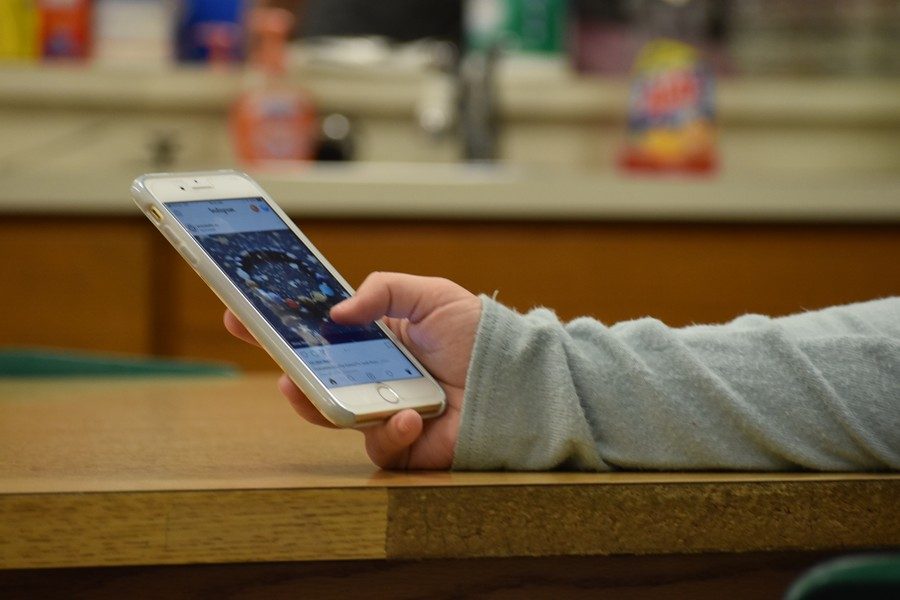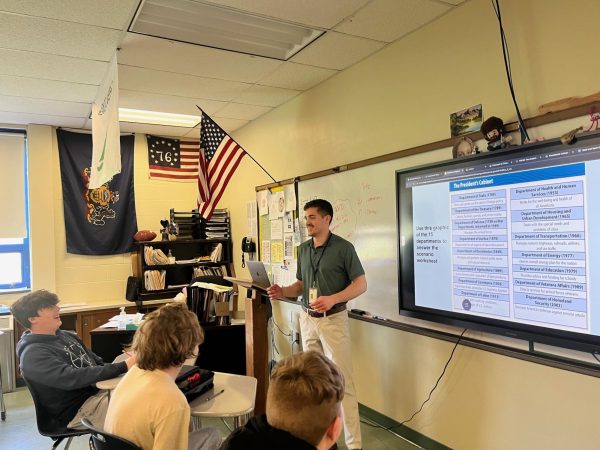Social media can negatively impact teens
Teens using social media frequently often find themselves unhappy.
December 7, 2018
Technology and social media have taken over society. Today’s teens are more involved with technology rather than any other generation. Ninety-five percent of teens use smartphones, and 45 percent say they are online almost constantly. About 70 percent of teens are on Snapchat and Instagram, while 85 percent are on YouTube.
However, in a time of apparent abundance teens are more in need of real connections than ever.
There’s a connection between excessive social media use and higher rates of teen depression. Teens who experience excessive social media use not only experience depression, they also face lower self-esteem, social isolation, poor concentration, decreased activity, and sleep disruptions.
“Individuals oftentimes say or post things over social media that they may not otherwise have said. It’s easy to make an impulse decision when you have such easy access to social media, and I think it leads to students posting or saying something they may later regret. I think that it’s also easy for individuals to get pulled into a situation that may not involve them or to instigate a situation (intentionally or not),” said Bellwood-Antis Guidance Counselor, Mrs. Danielle McNelis.
It’s easy to make an impulse decision when you have such easy access to social media, and I think it leads to students posting or saying something they may later regret.
— Mrs. McNelis
More teen girls experience lower self-esteem compared to boys. Girls spend their time on social media comparing themselves to other people on social media, like Instagram; therefore, causing them to have lower self-esteem.
Mrs. McNelis said she has talked to more girls than boys about concerns regarding social media – whether it’s something they said or posted and/or something that someone else said or posted about them. It’s not that boys aren’t involved, they have just been less likely to bring it to attention. Any individual can be affected by social media.
Recent studies have shown that social media can push teens to points beyond depression. According to data from the Centers for Disease Control and Prevention, suicide rates for teens rose between 2010 and 2015 after declining for almost two decades. There are several specific ways that social media can increase risk for presuicidal behavior. Cyberbullying and cyber harassment, for example, are serious and prevalent problems.
Most people today think that social media makes them more connected, but it does the exact opposite. Social media makes teens feel more isolated by making them worry about what parties they’re not invited to, but it’s even worse when you consider its effect on academic habits.
Studies have shown that multitasking between homework and interacting with social media is making attention issues worse and reduces learning and performance. When teens are spending all their time on social media, they are spending less time on activities that could increase mental skills and physical health.
Most teens spend time at night on their phones or social media accounts rather than going to sleep. This causes teens to get less sleep. It has negatively affected teens when it comes to interacting with one another in person rather than online through social media.
The average person checks their phone up to 28 times a day making it practically an addiction, but social media platforms can have their benefits. Mrs. McNelis said one positive impact of increased exposure to technology is more students are learning to be more responsible with it.
“When snapchat was created, it provided more opportunity for students to make poor decisions because of the impression that things would ‘disappear.’ I do think that many students are becoming more aware of the consequences of their decisions involving social media and that sometimes positively impact their choices,” said Mrs. McNelis.
Mrs. McNelis said social media and technology are great tools when in the hands of students using it for the right reasons.
“Technology is an amazing thing if used responsibly and for the right reasons. I think it’s important to mention that there are many students who do use social media responsibly. I hope that number continues to increase moving forward,” Mrs. McNelis said about the positives of social media.
Because social media is a relatively new phenomenon, the verdict is still out on the extent of its risk to the mental health of teens. Some studies show how the online connections between friends can be beneficial, where as other research concludes that social media is causing symptoms of anxiety, depression, and eating disorders to rise.

















